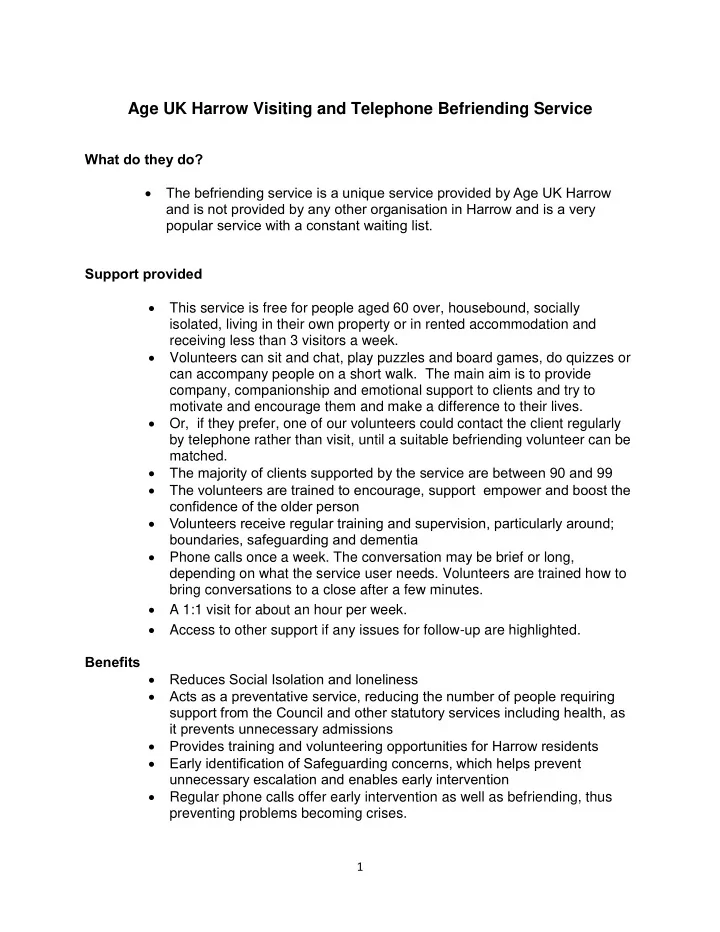

Age UK Harrow Visiting and Telephone Befriending Service What do they do? The befriending service is a unique service provided by Age UK Harrow and is not provided by any other organisation in Harrow and is a very popular service with a constant waiting list. Support provided This service is free for people aged 60 over, housebound, socially isolated, living in their own property or in rented accommodation and receiving less than 3 visitors a week. Volunteers can sit and chat, play puzzles and board games, do quizzes or can accompany people on a short walk. The main aim is to provide company, companionship and emotional support to clients and try to motivate and encourage them and make a difference to their lives. Or, if they prefer, one of our volunteers could contact the client regularly by telephone rather than visit, until a suitable befriending volunteer can be matched. The majority of clients supported by the service are between 90 and 99 The volunteers are trained to encourage, support empower and boost the confidence of the older person Volunteers receive regular training and supervision, particularly around; boundaries, safeguarding and dementia Phone calls once a week. The conversation may be brief or long, depending on what the service user needs. Volunteers are trained how to bring conversations to a close after a few minutes. A 1:1 visit for about an hour per week. Access to other support if any issues for follow-up are highlighted. Benefits Reduces Social Isolation and loneliness Acts as a preventative service, reducing the number of people requiring support from the Council and other statutory services including health, as it prevents unnecessary admissions Provides training and volunteering opportunities for Harrow residents Early identification of Safeguarding concerns, which helps prevent unnecessary escalation and enables early intervention Regular phone calls offer early intervention as well as befriending, thus preventing problems becoming crises. 1
The visiting element provides a more intensive involvement for those who are extremely isolated. A sense of security - knowing someone is checking up on them Supported independence: people are enabled to live in their own homes for longer, delaying the need for residential care for many Peace of mind for relatives Need The highest proportion of safeguarding allegations are about older people (44 % - 156 cases) 48,000 people over 65 in Harrow Highest population of over 65 year olds in North West London Older adults who feel lonely are 64% more likely to have developed dementia in three years compared to those who are not lonely Clients are housebound with no costed services and for many people it will be the only human contact they have all week The service protects the most vulnerable by picking up issues in the community before it reaches crisis point. Promotion The service is promoted on our website, through dedicated leaflets, at information events, via posters in local GP’s surgeries and through holistic assessments for any AUK Harrow service and promotional talks to specific teams, e.g. social workers, OTs. All local services (LA/ NHS/vol orgs) can fax, email or phone in referrals. A high percentage is either self/family referrals or internal referrals (users of other services). Volunteering Our volunteers do not do cleaning, help with personal care or accompany to hospital or doctor’s appointments. Volunteers are offered group supervision regularly, often with a training element included, addressing issues such as boundaries, where the organisation or volunteers have become aware of any needs or deficiencies or practice issues. Clients : Outcomes for clients are measured via: Annual satisfaction questionnaires Informal feedback from service users, volunteers and relatives, which often provides specific detail (e.g. “Your service helped me...”) – comes in Christmas cards, phone calls or more formal letters Feedback from other services in terms of outcomes achieved from onward referrals. 2
Resources: 1 pt Officer (25hrs), 30 volunteers 3
Recommend
More recommend